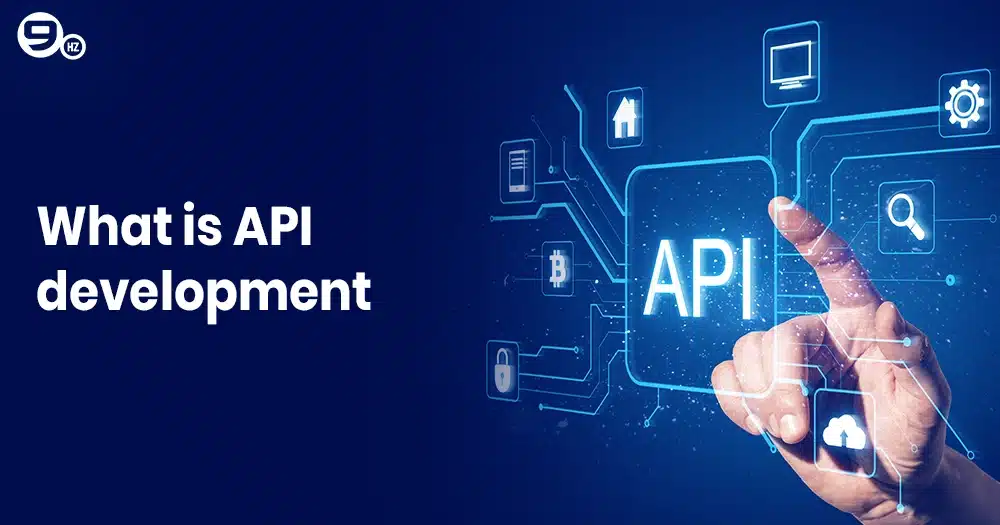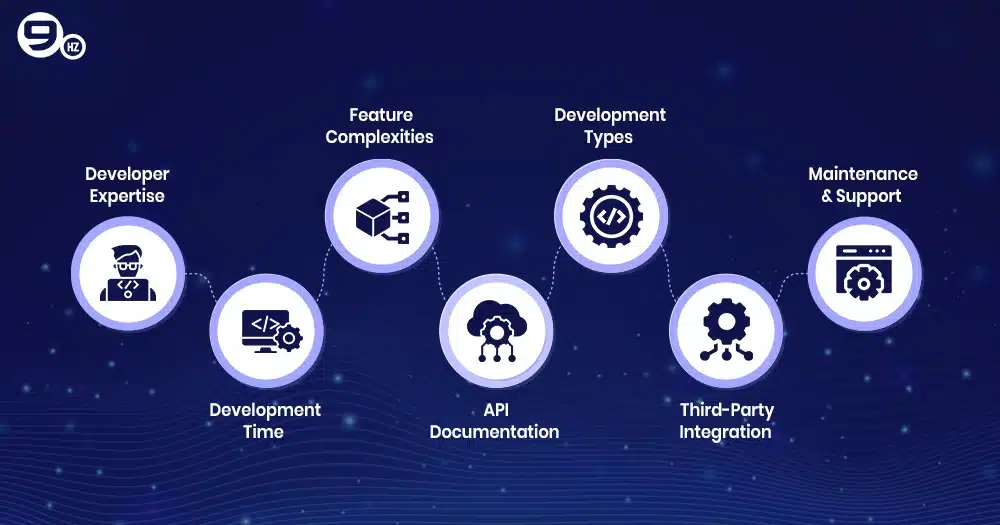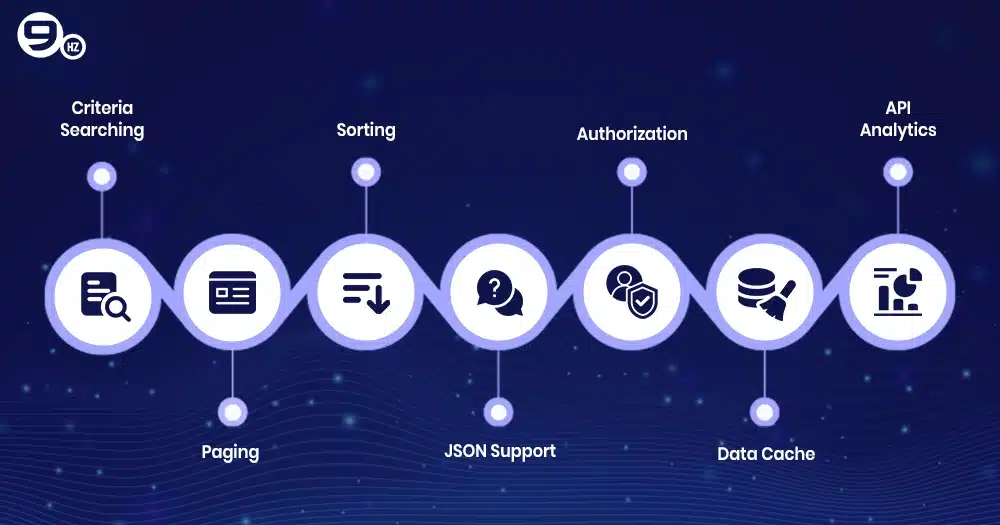Have you noticed that developers are continuously innovating app features using AI and ML, like checking weather updates on smartphones or enabling instant money transfers through banking apps? It’s all made possible through APIs. Software and app development is one of the fastest-growing niches, with APIs acting as gateways for data transfer and creating seamless interfaces for better collaboration. Integrating an API simplifies complex functionalities, saving time and eliminating the need for extensive coding from scratch. As more businesses adopt this approach, understanding the cost to develop API solutions becomes crucial — especially with the global API management market projected to reach $18.62 billion by 2028.
Businesses are increasingly focusing on API development by following the right documentation, procedures, protocols, and tools, ensuring they can add new features or updates without starting from scratch. Partnering with an experienced API development company can streamline this process and ensure scalable, cost-effective solutions. But have you ever given thought to how much it actually costs to build an API? No worries — this detailed blog will guide you through everything you need to know about the cost to build an API.
What is API development?
API stands for Application Programming Interface. It is a set of guidelines, standards, and requirements that allow an app or software to use the capabilities of another platform, application, or device. We can take examples of airlines that use third-party APIS to search thousands of flights and locations to confirm your trip at your quoted price.
API development refers to the process by which developers create and test protocols, tools, and instructions that allow two different software systems to transfer data and perform functions. These methodologies include designing APIs, implementing code, testing options, documentation, deployment, and performance monitoring.
API development comes in different forms based on specific needs and requirements:
- REST APIs: This API is a simple web design, more compatible and scalable for web standards. Examples Include Cloud Services, CMS, Public APIs, and IoT.
- SOAP (Simple Object Access Protocol) APIs: They have a more rigid and structured process for navigating protocols, encoding data, and adhering to predefined rules. Example: B2B integration, telecommunication, financial, and web services
- WebSocket APIs: They support real-time data transfer, cross-platform compatibility, and extended communication between the client and server. Examples: Streaming services, multiplayer games, IoT, or real-time analytics
- GraphQL APIs: They use a query language for data transfer, provide a single endpoint, allow data fetching, and enable real-time updates. Examples: Mobile apps, third-party integration, Single-page applications.
Cost to build an API (Complexity, cost, time duration)
The average API development cost can range between $500 to $ 1,000,000, depending on various factors, including features, complexity, security, and documentation. Also, when the developers work on API development, it includes costs related to development, operations, support, maintenance, data, and security.
Every business should carefully assess API development costs to ensure they align with business goals and budgets.
| Complexity Level | Use Case / Features | Estimated Cost (USD) | Timeline |
|---|---|---|---|
| Prototype / MVP API | One or two endpoints, minimal logic, internal use only | $500 – $1,500 | 3 – 7 days |
| Basic Public API | Simple CRUD operations, basic data access, publicly consumable | $1,000 – $3,000 | 1 – 2 weeks |
| Authentication API | Secure login/signup, token-based auth (e.g., JWT, OAuth) | $2,000 – $5,000 | 1 – 3 weeks |
| Third-Party Integration API | Connects with payment gateways (Stripe, PayPal), social logins, maps, etc. | $3,000 – $7,000 | 2 – 4 weeks |
| Real-Time API | WebSockets, push notifications, chat systems | $5,000 – $15,000 | 3 – 5 weeks |
| E-commerce API | Inventory, product catalogue, order processing, cart, payment | $10,000 – $20,000 | 1 – 2 months |
| Analytics/Data API | Data aggregation, filtering, chart-ready responses, and dashboards | $10,000 – $25,000 | 1 – 2 months |
| Enterprise-Grade API | Highly scalable, rate limiting, caching, monitoring, multi-role access | $25,000 – $50,000+ | 2 – 4 months+ |
| API-as-a-Product | Full lifecycle API product, extensive documentation, and monetisation features | $50,000 – $100,000+ | 3 – 6 months+ |
Some additional costs to develop an API include:
| Component | Details | Cost |
|---|---|---|
| API documentation | Clear guides for users | $500–$2000 |
| Testing & QA | Automated and manual testing | $1000–$5000 |
| Security & Compliance | Encryption, GDPR, HIPAA, etc. | $2000+ |
| Ongoing Maintenance | Bug fixes, updates, and monitoring | $500–$2000 |
API Development Cost Based on Technology
Developers use a range of technologies for API development, and it can directly influence the overall cost estimation. So, here is the table representing the cost to develop an API based on multiple technologies, along with popular tools in the market:
| Technology Stack | Description / Use Case | Estimated Cost (USD) | Popular Tools / Frameworks |
|---|---|---|---|
| Node.js / Express | Great for real-time apps, fast development, and the JavaScript ecosystem. | $5,000 – $20,000 | Express.js, NestJS |
| Python / Django/Flask | Easy to use, good for ML, data-heavy apps, RESTful APIs. | $5,000 – $25,000 | Django REST Framework, Flask |
| Ruby on Rails | Rapid development, convention over configuration. | $7,000 – $30,000 | Rails API mode |
| Java / Spring Boot | Strong for enterprise-grade systems, large-scale apps. | $10,000 – $50,000+ | Spring Boot, Jakarta EE |
| .NET Core (C#) | Microsoft stack, great for enterprise or Windows environments. | $10,000 – $45,000 | ASP.NET Core Web API |
| PHP / Laravel | Simple, fast for small to mid-sized projects. | $4,000 – $15,000 | Laravel, Lumen |
| Go (Golang) | High-performance APIs, concurrency, and microservices. | $7,000 – $30,000 | Gin, Echo |
| GraphQL APIs | Flexible query APIs, typically layered over Node.js or Python. | $7,000 – $35,000 | Apollo Server, Graphene (Python) |
| Firebase / Serverless | Fast to build, low infra cost, pay-as-you-go, but limited flexibility. | $2,000 – $10,000 | Firebase Functions, AWS Lambda, Azure Functions |
| Rust / Actix / Rocket | High-performance and memory-safe APIs, cutting-edge. | $10,000 – $40,000 | Actix Web, Rocket |
Factors Affecting the Cost to Build an API
Above, we have discussed an estimated API development cost using a table; however, multiple factors influence the cost of building an API. Let’s break down some key components to consider while calculating API development costs:
Developer Expertise
One of the crucial factors is the developer’s experience and expertise, who can understand your project requirements, and on that basis, they will charge. If you are looking for an advanced feature API, you need to hire skilled developers with specialised technical knowledge on a project or time basis, where the cost will be higher.
Development Time
API development can take anywhere from weeks to months that entirely depends on the complexity of features and functionalities. This process begins with research, database design, prototyping, and exploring Minimum Viable Product (MVP) versions that directly impact development costs.
Feature Complexities
Adding more complexities to API integration will increase development costs. Basic APIs follow simple protocols to fetch data. However, advanced features, including authentication, real-time processing, third-party APIs, and others, can push the cost.
API Documentation
Documentation helps developers follow guidelines and integrate APIs effectively. Companies hire technical writers to document everything from the overview to methods, parameters, request formats, authentication, code examples, SDKs, and libraries. The type of documentation that developers prefer to use will add to the development cost.
Development Types
The cost to build an API will also depend on the type of API you prefer, including open API, internal API, partner API, composite API, REST API, and SOAP API. Development costs will vary for each type, with its technology integration and architecture.
Third-Party Integration
APIs rely on third-party software and applications, such as payment gateways, CRM software, and analytics tools, which can increase costs. Depending on software compatibility and integration, the developer will integrate multiple features, which will add to the overall cost.
Maintenance and Support
Estimating the cost to build an API doesn’t end with deployment. It can extend to ongoing maintenance and support expenses. Some key components include server and hosting fees, monitoring and optimization, security patches and updates, and backward compatibility.
Must-Have Features to Build an API
Developers must consider multiple features when developing APIs to enhance their usability and accessibility. Most companies prefer features that can make API more reliable, secure, and updated with the latest technologies. So, selecting the range of features depends on the requirement of basic to advanced functionalities. Here is a list of must-have features in the API:
Criteria Searching
One of the API’s integral features is that it enables customers to search data using various criteria within the application interface. Implementing data synchronisation updates supports adding this functionality.
Paging
This feature indicates that the API should display the exact changes that applications need to be updated. Using paging, users can set the number of pages to display for clients, allowing for a limited view of the data in specific use cases.
Sorting
It helps to sort application data by time and date for easy tracking of modifications and updates. Eventually, the end users will receive specific pages based on the input they provide to the system.
JSON Support
It is an important feature for developing a RESTful API that offers JSON (JavaScript Object Notation) format to provide better communication. This is a lightweight and human-readable format for structuring data between the client and server.
Authorization
One of the security-driven features in the API is authorisation via OAuth. Developers can introduce authorization via OAuth, reducing processing time and enhancing the API’s ability to operate faster and more smoothly.
Data Cache
Utilizing cache memory and storage features, it supports reducing the server load and improving response times by integrating CDN and Redis. This reduces strain on the primary data source and makes accessing data easier.
API Analytics
It is an unavoidable feature that tracks usage and performance, and monitors user behavior to optimize the API and its related usage patterns. Tracking real-time insights helps to gain updates and improve API management.
How can Ninehertz help you with API development?
NineHertz was founded in 2008 as a top software development company. A business or startup can consult with tech experts for API development, testing, and integration services. With a global presence across Australia, USA, UK, UAE, and India, it has delivered over 1800+ projects. With industry experience, NineHertz provides end-to-end API development that aligns with business requirements. Here, Core API development services include API integration, secure API testing and maintenance, scalable architecture, and security compliance.
Recognised as the top API development company, they have a dedicated professional team with expertise and proven experience in API technology integrations. Whether you’re looking to build an API or test tools, connect with NineHertz for the best development and deployment solutions.
Conclusion
By the end of the blog, you must know how much it cost to develop an API. For business, it is one of the strategic investments that require timely considerations for development time, developer hiring cost, maintenance, documentation, and marketing cost. Primarily, these factors help assess the cost of API development, enabling businesses to make informed decisions about resource allocation for successful API projects. However, the cost of building an API may vary for businesses based on their specific project requirements.
APIs are more than just a tool. They transform how we interact with software and apps. So, if you are struggling to find an ideal API integration solution and its development cost projections, it is advisable to consult the best API development company, which has expertise and proven years of experience in delivering industry-ready APIs.
Frequently Asked Questions
What factors influence the cost of API development?
Some key factors affecting the cost of API development include feature complexity, types of API, authentication, third-party integration, scalability, documentation, technology stack, and frameworks.
How to Reduce the Cost to Build an API?
You can follow various ways to reduce costs, which include building a Minimum Viable Product (MVP), utilizing open-source tools and frameworks, automating API documentation, and leveraging API management platforms.
Is it more expensive to develop an API compared to other countries?
Yes, the cost of developing an API may vary by country. Here are the different charges region-wise:
- United States / Canada: $100 – $200/hr
- Western Europe (UK, Germany, France): $80 – $150/hr
- Eastern Europe (Ukraine, Poland, Romania): $30 – $70/hr
- India / South Asia: $20 – $50/hr
- Southeast Asia (Philippines, Vietnam): $25 – $60/hr
- Latin America (Brazil, Mexico, Argentina): $30 – $70/hr
Are there any hidden costs when hiring API developers?
Yes, there are hidden costs to hiring API developers that include additional features, support, maintenance, onboarding, project management, licensing, data security, testing, and QA.
What are the common pricing models for API development?
Common pricing models for API development include fixed price, hourly rate, retainer model, pay-per-use, subscription model, equity-based pricing, value-based pricing, and time-and-material pricing.
Great Together!












